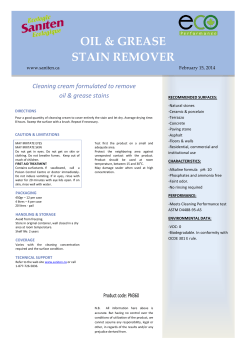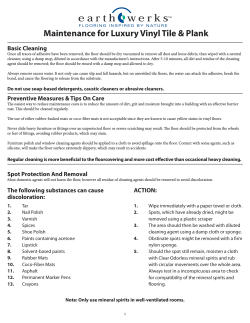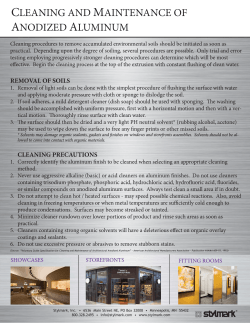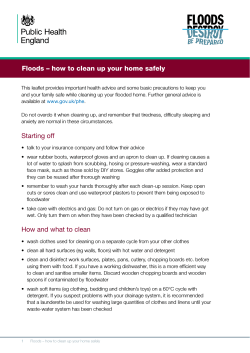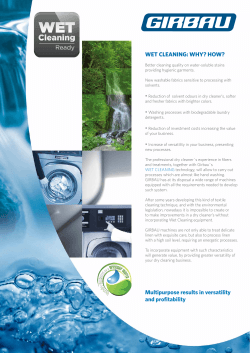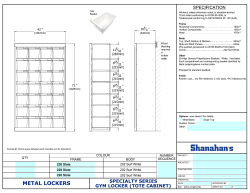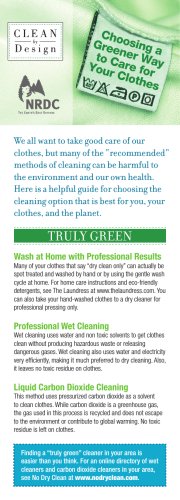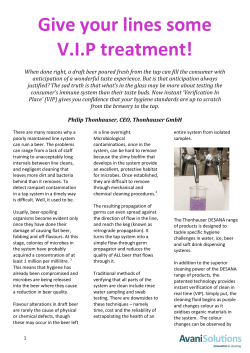
Document 276638
Sample Pharmacy CLEANING AND SANITIZING PROCEDURE P-304.1 1.0 Definition and Purpose: To standardize and define the process by which the controlled Cleanroom environments (ISO Class 5, 7, and 8) and the general pharmacy prep area is cleaned, disinfected, and maintained to insure a suitable environment exists for the aseptic preparation and processing of medications, intravenous solutions, and other admixtures. 2.0 3.0 Applicable Documents: 2.1 Daily Cleaning Solution Preparation Log (F-304.a) 2.2 Daily Cleaning Log for Controlled Cleanroom Environments (F-304.b) 2.3 Weekly/Monthly Cleaning Log for Controlled Cleanroom Environments (F-304.c) 2.4 General Pharmacy Area Cleaning Log (F-304.d) 2.5 Three Time Cleaning of Controlled Cleanroom Environments (F-304.e) Policy: 3.1 All ISO Class 5 work areas, including Laminar Air Flow Hoods (LAFW) and Biological Safety Cabinets (BSC) shall be cleaned and disinfected on a daily basis, in accordance with the following procedure. 3.2 Ideally, cleaning should occur at the end of compounding day to prevent any component residue from sitting overnight and promoting bacterial growth. 3.3 If cleaning occurs at the start of the compounding day, adequate time must be given to allow all cleaned surfaces to dry PRIOR to starting any compounding activity. 3.4 If any compounding occurs during after-hours conditions (on-call situation), additional cleaning may occur at the start of the next business day. 3.5 Cleaning and sanitation of the controlled pharmacy environments will not be performed during routine compounding periods. 3.6 Pharmacy personnel performing the cleaning/disinfecting functions will be appropriately attired, in accordance with the Sample Pharmacy Gowning and Gloving Procedure (4041). 3.7 All cleaning equipment and supplies shall be stored in a designated area to ensure segregation from compounding supplies. 3.8 All cleaning equipment (mops and brushes) will be hung vertically to promote drying when not in use. Buckets should be inverted when not in use. 3.9 Tacky Mats may be placed at the entrance to controlled areas within the pharmacy compounding area to remove debris from personnel and equipment as they enter these areas. The Pharmacy Manager will determine the location of the tacky mats depending on workflow and room configuration. @1997-2006 Clinical IQ, LLC All rights reserved Page 1 of 4 Sample Pharmacy CLEANING AND SANITIZING PROCEDURE 3.10 Any compounding equipment (i.e. automated compounders, devices, or pumps) utilized during the compounding process will be subject to the same cleaning requirements as the LAFW / BSC itself. 3.11 If any equipment or device used in the compounding of patient product or solutions is removed from the ISO Class 5 compounding room, it must be properly cleaned and disinfected prior to being placed back into service within that environment. 3.12 If desired, the germicidal cleaning agent may be alternated with Sodium Hypochlorite (NaOCl) on a monthly basis. NOTE: The possibility of producing germicidal resistant microorganisms is not possible. 4.0 Materials and Equipment: 4.1 Plastic Buckets with rounded edges 4.2 Low particulate shedding cellulose mops (Rollomatic or equivalent) 4.3 Low particle shed wipes (Texwipes or equivalent) 4.4 Appropriate Germicidal detergent 4.5 Sodium Hypochlorite Solution (Clorox or equivalent) NOTE: Germicidal detergent and Sodium Hypochlorite solutions are irritants and can damage the skin and eyes. The use of gloves must be worn and during the cleaning of walls and ceilings, safety glasses should be used. 5.0 Procedure: 5.1 Prior to start of the cleaning/sanitizing procedures; prepare an adequate quantity of cleaning solutions. Select an appropriate agent(s), based on the solutions that were utilized in the preceding month. 5.2 Carefully mix the cleaning solutions as per the chart below. Document the preparation of the daily cleaning solution on the Daily Cleaning Solution Preparation Log - immediately after preparing the solution. Water: Potable or filtered 1 liter 5 liters 10 liters Suitable detergent Depends on the detergent used Bleach 10 – 20 mL 50 – 100 mL 100 – 200 mL 5.3 Each area of the pharmacy cleanroom shall have its own cleaning bucket (i.e. Hood bucket, Floor bucket, Walls and Ceiling bucket, Prep room bucket). Each bucket will be clearly marked or labeled as such. This will prevent any possible contamination of critical work areas such as the laminar airflow hood being cleaned with solution from the floor bucket. 5.4 Allow the mops to soak in their respective buckets, in solution, for approximately five (5) minutes prior to the start of cleaning. ©1997-2006 Clinical IQ, LLC All rights reserved Page 2 of 4 Sample Pharmacy CLEANING AND SANITIZING PROCEDURE 6.0 5.5 Cleaning must occur from the cleanest to the dirtiest areas. 5.6 The lowest class room or environment (i.e. ISO Class 5), will be cleaned before the ISO Class 7 compounding room, and then the adjoining ISO Class 8 anteroom and prep area. 5.7 Always start at the innermost part of the pharmacy Cleanroom, cleaning towards the exit when washing floors to avoid walking over cleaned areas. 5.8 Insure that the tops of doors and door jams, including those of the outside entrance are cleaned with a wipe daily. 5.9 No high particle shedding materials may enter the Cleanroom, this includes corrugated card-board, paper documents (i.e. compounding worksheets, and order forms) are allowed, but should be kept to a minimum. No worksheets or order forms should enter the ISO Class 5 environment. 5.10 Document cleaning procedure on appropriate log immediately upon completion of the task to insure proper documentation. Cleaning LAFW / BSCs: 6.1 Gown and glove, in accordance with Sample Pharmacy Gowning and Gloving Procedure (P-404.1). 6.2 If the laminar airflow hood / biological safety cabinet has been turned off, restart and allow to run a minimum of 30 minutes prior to cleaning. Ideally, the LAFW or BSC’s should never be turned off. 6.3 Inspect the inside of the hood for any spills or puddles of crystallized compounding components. Clean the spills with sterile water prior to proceeding with the routine cleaning procedure. 6.4 If cleaning was performed the night before, at the start of each new workday, the LAFW / BSC must be wiped down with a wetted isopropyl alcohol wipe. This will remove any residual-cleaning agent from the critical work areas and will sanitize the hood. 6.5 Start cleaning activity within the LAFW / BSC environment moving outward working from inner to outer surface. DO NOT SPLASH THE HEPA FILTER WITH CLEANING SOLUTION. Carefully clean the Hood HEPA grills. NOTE: DO NOT wipe in a large circular motion across the work surface, as it is likely contaminants and particulate matter will be introduced into the rear portion of the hood as they are captured, carried, and deposited from the front edge of the LAFW. 7.0 6.6 Additionally, critical work areas will be wiped down in between patient orders, or at anytime a spill occurs with isopropyl alcohol. Do not spray alcohol directly into the hood. Wet a wipe with isopropyl alcohol outside of the hood. Spraying within the hood can potentially damage the HEPA filter over time. 6.7 Document all cleaning activity on the appropriate cleaning log immediately upon completion of the task. Daily Cleaning: ©1997-2006 Clinical IQ, LLC All rights reserved Page 3 of 4 Sample Pharmacy CLEANING AND SANITIZING PROCEDURE 8.0 9.0 7.1 Perform and document all required cleaning as detailed on the Daily Cleaning Log for Controlled Cleanroom Environment (F-304.a) 7.2 Perform and document all required cleaning for the general pharmacy as detailed on the General Pharmacy Area Cleaning Log (F-304.d) Weekly Cleaning: 8.1 Perform and document all required cleaning as detailed on the Weekly/Monthly Cleaning Log for Controlled Cleanroom Environments (F-304304.c) 8.2 Perform and document all required cleaning for the general pharmacy as detailed on the General Pharmacy Area Cleaning Log (F-304.d) Monthly Cleaning: 9.1 Perform and document all required cleaning as detailed on the Weekly/Monthly Cleaning Log for Controlled Cleanroom Environments (F-304.c) ***Be careful that BOTH the monthly AND weekly cleaning requirements are completed as detailed on the cleaning log*** 9.2 10.0 Clean the exterior and interior of refrigerated storage units, refrigerators and freezers, using an acceptable cleaning agent listed above under LAFW/BSC cleaning. Three-Time Cleaning: 10.1 Three-time cleaning occurs when the following conditions occur: 10.1.1 After any out-limits conditions occurring during environmental monitoring air or surface sampling procedures. 10.1.2 After any maintenance work performed in the cleanroom that would compromise environmental integrity. 10.2 11.0 Perform and document all required cleaning as detailed on the Three Time Cleaning of Controlled Cleanroom Environments (F-304.e) Floor Refinishing: 11.1 The Cleanroom floors shall be stripped of their existing finish as determined by the pharmacy manager or her/his designee, and refinished by qualified personnel on an as needed basis, but not for a period to exceed one year. The materials utilized will be of such composition as to not compromise the integrity of the Cleanroom environment, and should be manufactured for the expressed purpose of maintenance of Cleanroom flooring. NOTE: Most states require Licensed Pharmacy Personnel to be on the premises during such activity, or while non-employees are in restricted pharmacy areas. ©1997-2006 Clinical IQ, LLC All rights reserved Page 4 of 4 Sample Pharmacy Daily Cleaning Log for Controlled Cleanroom Environments Month: ______________, Year: ________ Prior to the start of cleaning, prepare and document preparation of cleaning solution on the Daily Cleaning Solution Preparation Log ISO CLASS 5 HOODS AND ISO CLASS 7 COMPOUNDING ROOM 1. REMOVE ALL COMPOUNDING COMPONENTS/SOLUTIONS FROM HOODS AND COMPOUNDING ROOM 2. USING A FRESH WIPE, CLEAN THE INTERIOR OF THE HOOD WORKING FROM INNER TO OUTER SURFACE.. AVOID SPLASHING THE HEPA FILTER WITH CLEANING SOLUTION. CAREFULLY CLEAN THE PROTECTIVE HEPA FILTER GRILL AND COMPOUNDIN EQUIPMENT (if necessary). 3. WIPE THE FRONT FACE OF HOODS WORKING TOP TO BOTTOM (if applicable). 4. SOAK ALL ANCILLARY COMPOUNDING EQUIPMENT SUCH AS CLAMPS, SCISSORS, and CRIMPERS IN THE HOOD BUCKET FOR APPROXIMATELY 5 MINUTES. LAY OUT TO DRY ON TOP OF COMPOUNDING ROOM CART. 5. STARTING AT THE INNERMOST PART OF CLEAN ROOM, CLEAN THE FOLLOWING AREAS WORKING TOWARDS THE ANTERIOR DOOR: a. INTERIOR AND EXTERIOR OF CART PASS THROUGH DOORS AND DOOR JAMS b. TABLES, CARTS, SHELVES, CHAIRS, INCLUDING LEGS AND CASTERS c. INTERIOR OF COMPONENT TOTES, EXTERIOR OF TOTES AS NEEDED d. DOOR JAMS AND DOOR HANDLES 6. REMOVE TRASH AND CLEAN ALL TRASH BINS AND OUTER SURFACES OF SHARPS CONTAINERS. 7. MOP FLOORS INCLUDING CART PASS THRU FLOOR STARTING AT FARTHEST POINT FROM THE ENTRANCE AND WORKING TOWARDS THE ANTEROOM. FLOORS WILL BE THE LAST AREA CLEANED TO PREVENT WALKING OVER THEM. ANTEROOM/CHANGE ROOM (TO BE CLEANED AFTER THE COMPOUNDING ROOM HAS BEEN CLEANED) 1. WIPE DOWN ALL SHELVES. RACKS, TABLES, CARTS AND STOOLS (INCLUDING LEGS AND CASTERS) 2. WIPE DOWN THE INSIDE AND OUTSIDE SURFACES OF THE SINK 3. CLEAN THE DOOR JAMS INCLUDING THE DOOR HANDLES 4. REMOVE TRASH AND CLEAN ALL TRASH BINS 5. MOP FLOORS STARTING AT FARTHEST POINT FROM THE ENTRANCE AND WORKING TOWARDS THE EXIT. FLOORS WILL BE THE LAST AREA CLEANED TO PREVENT WALKING OVER CLEANED AREAS. DOCUMENT CLEANING BY CHECKING, SIGNING, AND DATING THE APPROPRIATE DATELINE: 1 st 12 th 23 rd 2 nd 13 th 24 th 3 rd 14 th 25 th 4 th 15 th 26 th 5 th 16 th 27 th 6 th 17 th 28 th 7 th 18 th 29 th 8 th 19 th 30 th 9 th 20 th 31 st 10 th 21 st 11 th 22 nd NOTE: Weekly/Monthly Cleaning will be performed and documented as per policy P-304. Indicate N/A on the day that the Weekly/Monthly Cleaning was performed in lieu of daily cleaning. ______________________________________________________________ Signature of Pharmacy Manager after document review ©1997-2006 Clinical IQ, LLC All rights reserved ____________________ Date F-304.b
© Copyright 2026
